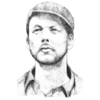Scientists have become the deus ex machina of TV dramas. Today's specialized fields have become so inaccessible to even the interested layman that the forensic scientists of CSI or the mathematicians of Numb3rs seem every bit as much magicians as magicians themselves, dabblers in arcane and unknowable matters. Though the science is ostensibly real, it lends an aura of the fantastic to the mundane business of fictionalized detection.
So it's fitting that in Physics of the Impossible (Doubleday, 329 pages, $26.95), the new book by radio pop physicist extraordinaire Michio Kaku, scientific realities and sci-fi freakouts should meet so amiably. Scientists have already succeeded in teleporting an atom—or, at least, the info contained within it. Objects have been turned invisible to red light. Ships may travel to stars within a century, pushed by solar sails. You like Star Trek? Antimatter, in minute amounts, has already been fashioned in a lab. Phasers? Force fields? Totally doable. One by one, Kaku lays out the real physical theories governing future-schlock scriptwriters' hefty bag of tricks.
Though it purports to be about impossible things, Kaku's book is in fact dedicated to the notion that almost everything is possible; he lays out the degrees of possibility of time travel, of psychokinesis, and of quantum-computing artificial intelligence. So you learn that the mind is a one-fifth-horsepower engine, that nuclear-bomb propulsion is less efficient than a 160-km-diameter hydrogen space scoop, that Paul Dirac—the discoverer of antimatter—may one day be remembered as rosily as Albert Einstein. Only precognition and perpetual motion, according to Kaku, are precluded by current understandings of the universe; these are small things to give up in a reality amenable to so many wonderful toys.
The details are, of course, fun, though Kaku's explanations (perhaps necessarily) leave the reader tantalizingly just under the threshold of real understanding. Still, Kaku is an engagingly concrete, clear-minded tour guide, even when much of what he describes might as well be in Swahili: metaphors in Swahili, beautiful dreams in Swahili, translated with aching omissions.
The overwhelming impression Kaku imparts is that science reaches its true limit only at the edges of desire, and of imagination fueled by desire. It is an almost touchingly anachronistic optimism, in a world whose reception of scientific breakthroughs is often mistrust. Still, if truth can follow fiction as ably as Kaku describes, then perhaps any failure of our science is a failure in us, and we should simply want better things, dream better dreams?
Start now, I guess. The wind out there is making noises like it's not coming back. .
READ: Michio Kaku reads from Physics of the Impossible at Powell's City of Books, 1005 W Burnside St., 228-0540. 7:30 pm Monday, April 13. Free.
WWeek 2015
